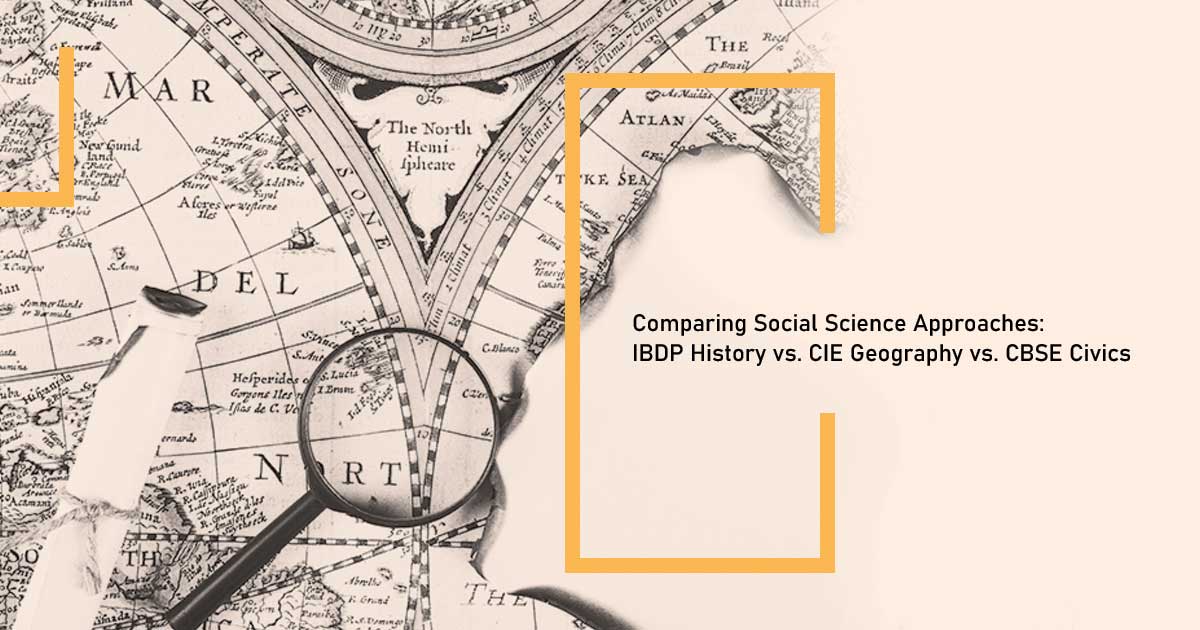

International Baccalaureate Diploma Programme (IBDP), Cambridge International Examinations (CIE) and Central Board of Secondary Education (CBSE) are some of the highly acclaimed educational programmes that offer interesting subject combinations in the field of social sciences. Today, we are going to explore and contrast the fundamentals of IBDP History, CIE Geography, and CBSE Civics. IBDP History encourages an interdisciplinary approach, blending elements of history, geography, economics, and political science. On the other hand, CIE Geography focuses on spatial analysis, examining physical and human geography, including topics such as climate, population, urbanisation, and environmental issues. CBSE Civics is primarily concerned with the Indian political system, governance, and civic responsibilities. The subject provides an in-depth understanding of the Indian political landscape. Let us dive deeper into each topic:
IBDP History vs. CIE Geography vs. CBSE Civics: An Overview
The IBDP History is one of the subjects offered under IBDP, which was launched by the International Baccalaureate Organisation (IBO) in 1968. The programme was initially created to provide a standardised curriculum for students from diverse backgrounds, such as diplomats' children, who moved frequently due to their parents' work. Over the years, it has evolved into a rigorous, internationally recognised educational programme for students aged between 16-19 years worldwide.
The CIE Geography is one of the subjects offered under the International General Certificate of Secondary Education (IGSE). IGCSE is an internationally recognised qualification for students typically aged 14 to 16, that is offered by Cambridge Assessment International Education (formerly known as Cambridge International Examinations). IGCSE was founded to provide high-quality educational assessments and qualifications that are recognised by institutions globally.
CBSE Civics is one of the subjects grouped in the Humanities section of the CBSE curriculum for 10+2. CBSE was established in 1962 by the Government of India as a national board of education. The main objective of CBSE is to standardise and regulate the quality of education in India and to cater to the educational needs of the rapidly growing Indian population.
IBDP History vs. CIE Geography vs. CBSE Civics: Curriculum and Assessment
The IBDP History curriculum is structured into different historical periods and themes. Students can choose one HL subject out of the four options, viz, History of Africa and the Middle East, History of America, History of Asia and Oceania, and History of Europe. There are different forms of assessments such as including written exams, research projects, and oral assessments.
The CIE Geography curriculum covers various aspects of physical and human geography. CIE offers different syllabuses or course options in Geography, such as Human Geography and Physical Geography. Students have to typically appear for written examinations, besides completing their practical assessments, and coursework.
CBSE Civics is part of the Indian curriculum and focuses on topics related to the Indian political system, governance, and citizenship. The curriculum typically includes subjects such as the Indian Constitution, the Indian Parliament, local government, and civic responsibilities. The assessment is conducted by the board itself and usually includes written exams and periodic assessments.
IBDP History vs. CIE Geography vs. CBSE Civics: Scope
After studying IBDP History, students can pursue higher education and choose careers as historians, conducting research, writing historical books, and contributing to academia. The programme's global perspective prepares students for roles in diplomacy, international organisations, and foreign service. Students can also become journalists or writers, covering historical and political events or working as investigative reporters. Furthermore, the critical thinking and research skills gained in IBDP History can be valuable for pursuing a career in law.
Similarly, after completing CIE Geography and relevant higher education, students can pursue a career in environmental consulting, conservation, and sustainability. They can utilise their skills and knowledge to contribute to the field of urban planning, real estate, and infrastructure development. Additionally, careers in cartography and geospatial technology are also lucrative options in this field. Students can also pursue advanced degrees and become researchers or university professors in their respective fields.
After completion of 10+2 in CBSE Civics, students can pursue higher education and opt for civil services such as Indian Administrative Service (IAS), Indian Police Service (IPS), and other government positions. Students can pursue law degrees and work as lawyers, legal consultants, or judges. Furthermore, students can implement their knowledge of policy analysis and understanding of government processes to pursue careers in public policy and governance. Upon completion of CBSE 10+2 in Civics, students can opt for advanced programmes to choose any of the above roles.
Way Forward
IBDP, CIE, and CBSE offer distinctive educational experiences in the field of social sciences, each with its unique focus and approach. While IBDP History prepares students for careers in history, international relations, journalism, and law, CIE Geography helps students find opportunities in environmental fields, urban planning, and geospatial technology. On the other hand, CBSE Civics paves the way for careers in civil services, law, policy analysis, and political journalism. These programmes not only provide valuable knowledge but make students well-equipped to navigate diverse career opportunities and contribute meaningfully to society.
Recent Blogs
IGCSE Full Form
What is the International Baccalaureate?
IBDP Full Form
CIE Board Full Form
CBSE Full Form
Site Designed and Maintained By : Office of Communications, JAIN Group All rights reserved.